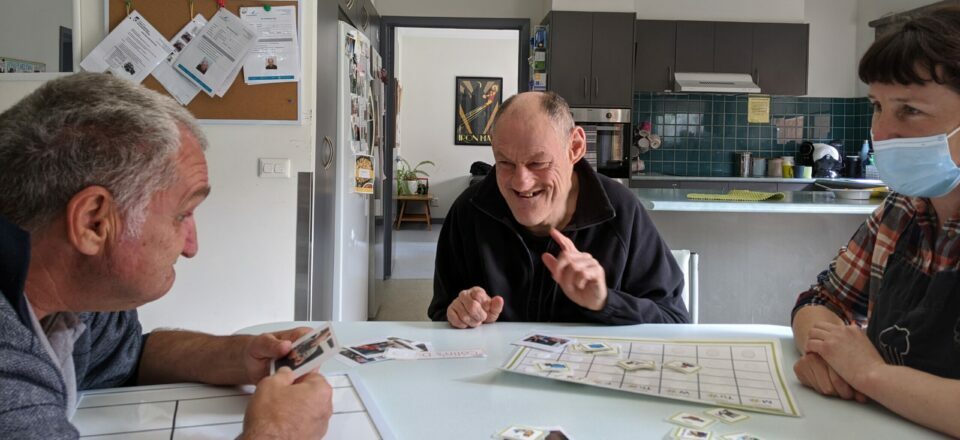How communication aids help housemates build better relationships
If you have complex communication needs and live in a Supported Independent Living (SIL) home, communication aids are a great way to get your message across.

Supported Independent Living (SIL) helps people with disabilities live more independently. SIL means getting the right support to live in your own home or a shared home with others. It helps you have more control and freedom in your daily life.
It is important to know if you are eligible for Supported Independent Living (SIL) under the NDIS. Understanding your eligibility means you can get the support you need to live more independently. The NDIS can help pay for the support services that make independent living possible for you.
Supported Independent Living (SIL) means getting help to live on your own or with others in a shared home. This support can include help with daily tasks, like cooking or cleaning, and personal care, like bathing or dressing. SIL helps people with disabilities to live more independently and be part of their community.
SIL is important because it allows people with disabilities to have more control over their lives. It helps them to make their own choices and decisions while getting the support they need. Under the NDIS framework, SIL provides the support needed to make independent living possible. This support is tailored to fit each person’s needs and goals.
You must be under 65 years old to join the NDIS. If you are over 65, you may need to get support from other services.
You need to be an Australian citizen, a permanent resident, or a New Zealand citizen with a Special Category Visa to qualify for the NDIS.
You must have a disability that affects your daily life. This means you need help with activities like getting dressed, moving around, or taking care of yourself.
To get Supported Independent Living (SIL), you need to have a significant and permanent disability. This means your disability must greatly affect your daily life and is not likely to change. Common conditions that may qualify for SIL include severe mobility issues, intellectual disabilities, or other impairments that make daily tasks difficult.
SIL eligibility is based on how much help you need with daily living skills. This includes things like cooking, cleaning, and personal care. Your level of support is assessed to determine if you need SIL to live independently. The more assistance you need, the more likely you are to qualify for SIL.
Your current living situation is also considered. SIL is best for people who cannot live independently without support. If you need help to manage your home or personal care, SIL might be right for you. Scenarios where SIL is appropriate include those who need regular support or supervision to stay safe and well.
To find out if you are eligible for Supported Independent Living (SIL), you will have an NDIS planning meeting. In this meeting, NDIS planners and Local Area Coordinators (LACs) will work with you to understand your support needs. They help decide what kind of SIL support you might need to live independently. It is important to prepare for this meeting by thinking about what help you need with daily activities and how SIL could benefit you.
You will need to provide evidence and documentation to show that you qualify for SIL. This includes medical reports, functional assessments, and other documents that show how your disability affects your daily life. Providing clear and detailed evidence is important because it helps NDIS planners and LACs understand your support needs better. The more information you give, the easier it will be for them to assess your eligibility for SIL and plan the right support for you.
1. How to Proceed if You Are Eligible for SIL
If you are eligible for Supported Independent Living (SIL), the next step is to work with your NDIS planner to develop a SIL plan. This plan will outline the support you need and how it will be provided. You will also need to choose a SIL provider who can deliver the support outlined in your plan. Your NDIS planner can help you find and select a provider that suits your needs.
2. What to Do if You Do Not Meet SIL Eligibility Criteria
If you do not meet the criteria for SIL, you can look into other types of support offered by the NDIS. There are many other services and supports that might be right for you. If you think you should be eligible or if your situation changes, you can ask for a reassessment. You also have the option to appeal the decision if you believe it was not correct. Your NDIS planner can guide you through these options and help you explore the best support available for you.
Understanding the eligibility criteria for Supported Independent Living (SIL) is crucial for accessing the support you need to live independently. Knowing whether you qualify can help you make informed decisions about your care and living arrangements. If you’re unsure about your eligibility or need guidance, don’t hesitate to consult with your NDIS planner or Local Area Coordinator (LAC). They can provide valuable support and help you navigate the process to find the best solution for your needs.
If you are looking for Supported Independent Living (SIL) services, consider choosing Scope Australia. They provide expert support to help you live independently and achieve your goals.